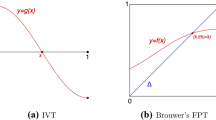Abstract
In the absence of the axiom of choice four versions of compactness (A-, B-, C-, and D-compactness) are investigated.
Typical results:
-
1.
C-compact spaces form the epireflective hull in Haus of A-compact completely regular spaces.
-
2.
Equivalent are:
-
(a)
the axiom of choice,
-
(b)
A-compactness = D-compactness,
-
(c)
B-compactness = D-compactness,
-
(d)
C-compactness = D-compactness and complete regularity,
-
(e)
products of spaces with finite topologies are A-compact,
-
(f)
products of A-compact spaces are A-compact,
-
(g)
products of D-compact spaces are D-compact,
-
(h)
powers X k of 2-point discrete spaces are D-compact,
-
(i)
finite products of D-compact spaces are D-compact,
-
(j)
finite coproducts of D-compact spaces are D-compact,
-
(k)
D-compact Hausdorff spaces form an epireflective subcategory of Haus,
-
(l)
spaces with finite topologies are D-compact.
-
3.
Equivalent are:
-
(a)
the Boolean prime ideal theorem,
-
(b)
A-compactness = B-compactness,
-
(c)
A-compactness and complete regularity = C-compactness,
-
(d)
products of spaces with finite underlying sets are A-compact,
-
(e)
products of A-compact Hausdorff spaces are A-compact,
-
(f)
powers X k of 2-point discrete spaces are A-compact,
-
(g)
A-compact Hausdorff spaces form an epireflective subcategory of Haus.
-
4.
Equivalent are:
-
(a)
either the axiom of choice holds or every ultrafilter is fixed,
-
(b)
products of B-compact spaces are B-compact.
-
5.
Equivalent are:
-
(a)
Dedekind-finite sets are finite,
-
(b)
every set carries some D-compact Hausdorff topology,
-
(c)
every T 1-space has a T 1-D-compactification,
-
(d)
Alexandroff-compactifications of discrete spaces and D-compact.
Similar content being viewed by others
References
Alas, O. T.: The axiom of choice and two particular forms of Tychonoff theorem, Portugal. Math. 28 (1969), 75–76.
Alexandroff, P. and Urysohn, P.: Mémoire sur les espaces topologiques compacts, Verh. Nederl. Akad. Wetensch. Aft. Naturk. Sect. 1 14 (1929), 1–96.
Banaschewski, B.: Compactification and the axiom of choice, Unpublished manuscript, 1979.
Bentley, H. L. and Herrlich, H.: Compactness and rings of continuous functions — without the axiom of choice, To appear (1995+).
Blass, A.: A model without ulrafilters, Bull. Acad. Sci. Polon., Sér. Sci. Math. Astr. Phys. 25 (1977), 329–331.
Čech, E.: On bicompact spaces, Ann. Math. 38 (1937), 823–844.
Chandler, R. E.: An alternative construction of βX and νX, Proc. Amer. Math. Soc. 32 (1972), 315–318.
Comfort, W. W.: A theorem of Stone-Čech type, and a theorem of Tychonoff type, without the axiom of choice; and their realcompact analogues, Fund. Math. 63 (1968), 97–110.
Feferman, S.: Some applications of the notion of forcing and generic sets, Fund. Math. 56 (1965), 325–345.
Gillman, L. and Jerison, M.: Rings of Continuous Functions, Van Nostrand, 1960.
Halpern, J. D.: The independence of the axiom of choice from the Boolean prime ideal theorem, Fund. Math. 55 (1964), 57–66.
Halpern, J. D. and Lévy, A.: The Boolean prime ideal theorem does not imply the axiom of choice, Proc. of Symposium Pure Math. of the AMS 13 (1971), Part I, 83–134.
Hartogs, F.: Über das Problem der Wohlordnung, Math. Annalen 76 (1915), 138–143.
Herrlich, H.: Wann sind alle stetigen Abbildungen in Y konstant? Math. Zeitschr. 90 (1965), 152–154.
Herrlich, H.: C-kompakte Räume, Math. Zeitschr. 96 (1967), 228–255.
Jech, T. J.: The Axiom of Choice, North-Holland, Amsterdam, 1973.
Kelley, J. L.: The Tychonoff product theorem implies the axiom of choise, Fund. Math. 37 (1950), 75–76.
Kennison, J. F.: Reflective functors in general topology and elsewhere, Trans. Amer. Math. Soc. 118 (1965), 303–315.
Krull, W.: Die Idealtheorie in Ringen ohne Endlichkeitsbedingungen, Mathem. Annalen 101 (1929), 729–744.
Läuchli, H.: Auswahlaxiom in der Algebra, Commentarii Math. Helvetici 37 (1962–63), 1–18.
Łoś, J. and Ryll-Nardzewski, C.: On the application of Tychonoff's theorem in mathematical proofs, Fund. Math. 38 (1951), 233–237.
Łoś, J. and Ryll-Nardzewski, C.: Effectiveness of the representation theory for Boolean algebras, Fund. Math. 41 (1955), 49–56.
Moore, G. H.: Zermelo's Axiom of Choice. Its Origins, Developments and Influence, Springer, New York, 1982.
Mrówka, S.: Compactness and product spaces, Colloq. Math. 7 (1959), 19–22.
Mycielski, J.: Two remarks on Tychonoff's product theorem, Bull. Acad. Polon. Sci. Sér. Sci. Math., Astr. Phys. 12 (1964), 439–441.
Rubin, H. and Rubin, J. E.: Equivalents of the Axiom of Choice II, North Holland, Amsterdam, 1985.
Rubin, H. and Scott, D.: Some topological theorems equivalent to the Boolean prime ideal theorem, Bull. Amer. Math. Soc. 60 (1954), 389.
Salbany, S.: On compact* spaces and compactifications, Proc. Amer. Math. Soc. 45 (1974), 274–280.
Sierpiński, W.: L'axiome de M. Zermelo et son rôle dans la théorie des ensembles et l'analyse, Bull. l'Acad. Sci. Cracovie Cl. Sci. Math. Sér. A (1918), 97–152.
Solovay, R. M.: A model of set theory in which all sets of reals are Lebesgue measurable, Ann. Math. 92 (1970), 1–56.
Stone, M. H.: The theory of representations for Boolean algebras, Trans. Amer. Math. Soc. 40 (1936), 37–111.
Stone, M. H.: Applications of the theory of Boolean rings to general topology, Trans. Amer. Math. Soc. 41 (1937), 375–481.
Tarski, A.: Ein Überdeckungssatz für endliche Mengen, Fund. Math. 30 (1938), 156–163.
Tychonoff, S.: Über die topologische Erweiterung von Räumen, Mathem. Annalen 105 (1930), 544–561.
Tychonoff, S.: Ein Fixpunktsatz, Mathem. Annalen 111 (1935), 767–776.
Ward, L. E.: A weak Tychonoff theorem and the axiom of choice, Proc. Amer. Math. Soc. 13 (1962), 757–758.
Zermelo, E.: Beweis, daß jede Menge wohlgeordnet werden kann, Mathem. Annalen 59 (1904), 514–516.
Author information
Authors and Affiliations
Additional information
Dedicated to My Friend Louis D. Nel on His Sixtieth Birthday
Rights and permissions
About this article
Cite this article
Herrlich, H. Compactness and the axiom of choice. Appl Categor Struct 4, 1–14 (1996). https://doi.org/10.1007/BF00124110
Received:
Accepted:
Issue Date:
DOI: https://doi.org/10.1007/BF00124110



